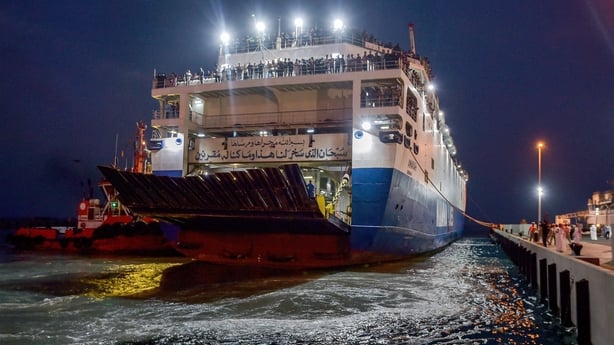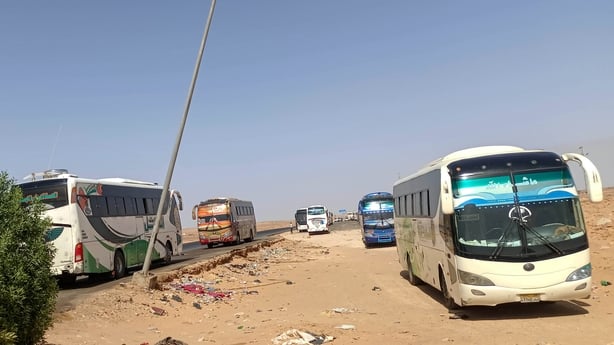Sudanese fighter jets hit paramilitaries in Sudan's capital Khartoum while deadly fighting and looting flared in the Darfur region, as the army said it would extend an existing ceasefire even as battles raged.
In the final hours of a repeatedly broken three-day truce, due to end at 11pm Irish time, the army said it would extend the truce "for an additional 72 hours" following pressure by Saudi Arabia and the United States.
There have been multiple ceasefire efforts since fighting broke out on 15 April between Sudan's army led by General Abdel Fattah al-Burhan and the paramilitary Rapid Support Forces (RSF) commanded by his deputy turned rival, Mohamed Hamdan Daglo. All have failed.
The RSF has not responded to the latest proposal.
US Secretary of State Antony Blinken said the ceasefire had been "imperfect", but "nonetheless has reduced violence".
Warplanes patrolled over Khartoum's northern suburbs as fighters on the ground exchanged artillery and heavy machinegun fire, witnesses said.
At least 512 people have been killed and 4,193 wounded in the violence, according to health ministry figures, although the real death toll is likely much higher.
Hospitals have been shelled and more than two thirds are out of service, the doctors' union said, reporting at least eight civilians killed in Khartoum alone yesterday.
The World Food Programme has said the violence could plunge millions more into hunger in a country where 15 million people - one-third of the population - need aid.
Abdou Dieng, United Nations aid chief in Sudan, speaking from Port Sudan, said he was "extremely worried about the situation", with food supplies a huge concern.
Violence beyond Khartoum
Fighting has also flared in the provinces, particularly in the war-torn western region of Darfur.
Witnesses said clashes raged for a second day in the West Darfur capital El Geneina, with pro-democracy medics reporting a doctor shot dead.
"We are locked up at home and too afraid to go out, so we can't assess the scale of the damage," said one resident.
The UN humanitarian agency said the fighting in West Darfur had disrupted food to "an estimated 50,000 acutely malnourished children".
The violence has trapped many civilians in their homes, where they have endured severe food, water and electricity shortages.
Those who can afford to have taken the long and risky journey to flee the country.
Egypt said that at least 14,000 Sudanese refugees had crossed the border since fighting erupted, as well as 2,000 people from 50 other countries.
"End the war", 50-year-old refugee Ashraf told the warring generals after entering Egypt. "This is your own conflict, not that of the Sudanese people."
At least 20,000 people have escaped into Chad, 4,000 into South Sudan, 3,500 into Ethiopia and 3,000 into the Central African Republic, according to the UN, which has warned if fighting continues as many as 270,000 people could flee.
Foreign governments have been working to get thousands of their citizens out.
More than 120 Irish citizens, dependents leave Sudan
So far, 122 Irish citizens and their dependents have been moved out of Sudan, Tánaiste and Minister for Foreign Affairs Micheál Martin said in a statement.
Some citizens have also made their way overland independently, he added, and it is expected the number will continue to rise in the coming days.
Flights are continuing today and registered citizens have been advised of details by the Irish embassy in the Kenyan capital Nairobi.
"Due to continued uncertainty about the duration of the current ceasefire, and the generally volatile situation in Sudan, we advise citizens, if they judge it safe to do so, to give serious consideration to evacuation options as they become available," Mr Martin said.
"Evacuation operations will only continue for as long as the security situation in Sudan allows."
Mr Martin said the evacuations had been carried out thanks to close cooperation with France, Spain, Sweden, Germany, the Netherlands, the UK and Jordan.
Since the Government decision on Sunday to deploy an Emergency Civil Assistance Team (ECAT) mission, led by the Department of Foreign Affairs, officials and Defence Force personnel have supported Irish citizens and their family members who have been evacuated through Djibouti, Jordan, Cyprus, Saudi Arabia and Egypt, the Tánaiste said.
Meanwhile, the Cabinet has agreed to transfer some Defence Force troops, currently in Djibouti assisting with the evacuation of Irish citizens from Sudan, to Cyprus.
This group will continue the mission with the assistance of the UK which is coordinating the Sudan evacuation from a base in Cyprus.
At a glance: What is happening in Sudan?
Sudan's Ambassador to Ireland, Adil Bannaga, said the Sudenese army was forced into war and it is "for peace".
Speaking on RTÉ's Six One, he said it was not two armed groups, but the Sudanese Army and the other established in 2013 as a rebel support force for the army.
Mr Bannaga said that he and the army were calling for a truce to allow people to get food supplies, but the rebel forces are targeting the public services such as "water, electricity and communication stations, hospitals ... about 90% are out of service".

As lawlessness has gripped Sudan, there have been several jailbreaks, including from the high security Kober prison where top aides of ousted dictator Omar al-Bashir were held.
Among the escapees is Ahmed Harun, wanted by the International Criminal Court to face charges of war crimes and crimes against humanity in Darfur.
Harun's escape sparked fears of the involvement of Bashir loyalists in the ongoing fighting.
The army said Bashir was in a military hospital, and the 79-year-old was moved before the fighting erupted.
The RSF emerged from the Janjaweed militia, accused of carrying out atrocities during Bashir's brutal suppression of ethnic minority rebels in Darfur in the mid-2000s.
He was toppled by the military in April 2019 following civilian mass protests that raised hopes for a transition to democracy.
The two generals seized power together in a 2021 coup, but later fell out, most recently over the planned integration of the RSF into the regular army.

'Bullets flying around' - UN representative
Marie Helene Verney, UN High Commissioner for Refugees Representative for South Sudan, said the agency hoped for a resolution to the fighting as she described how its work is being hampered by the violence.
Ms Verney told RTÉ's Morning Ireland how some UN staff in Khartoum and Darfur have been able to reach safer destinations in Sudan and neighbouring countries.
"The reality is that for the eight days they spent in Khartoum since they started fighting until we could evacuate them they could not work," she said.
"They were literally staying in their rooms and trying to avoid the bullets that were flying around."
She said UN staff who remain in the Sudanese capital are in a "safer place", maintaining operations where it is safe to do so and the plan is to bring colleagues back to their locations as soon as possible.
The South Sudan border is open, Ms Verney added, and the organisation has a very close relationship with Sudan.
She highlighted the importance of ensuring there is not a build up of people "being stuck at the border as they don't know where to go in South Sudan".
Additional reporting Mícheál Lehane

